|
|
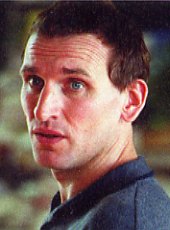 |
|
The
Ninth Doctor
(2005) |
|
|
|
|
|
|
The
Sound Vault |
|
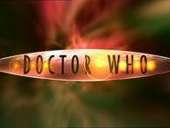 |
|
 |
|
| Rose
Tyler |
|
|
The Best Doctor
|
| |
| Vote
if I am your favourite Doctor |
|
|
|
|
|
 From the perspective of the public, the Ninth Doctor marked the Time Lord’s first full-time return to television after almost sixteen years. Initially debuting with what appeared to be a brand-new face and swiftly acquiring a new companion, later releases have given more information on his history before his televised debut. From the perspective of the public, the Ninth Doctor marked the Time Lord’s first full-time return to television after almost sixteen years. Initially debuting with what appeared to be a brand-new face and swiftly acquiring a new companion, later releases have given more information on his history before his televised debut.
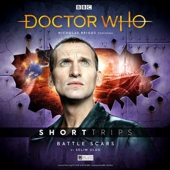 |
Short Trips "Battle Scars"
(Selim Ulug) |
|
 Unlike with all previous new Doctors, the audience did not have the chance to see this new Doctor’s regeneration at first, simply starting out with him already fairly comfortable with his new body. Subsequent material revealed that, as far as the Ninth Doctor knew, his regeneration was the result of old age following the devastation of the Time War between the Time Lords and the Daleks, which ended when his predecessor, the incarnation known as ‘The War Doctor’ (intended to be a warrior rather than a healer) destroyed both sides to end the war ("The Day of The Doctor"). The horror of that experience led to the new Doctor basically rejecting the idea of his predecessor as a Doctor, to the extent that he considered himself the Ninth Doctor even though this was his tenth body overall. Initially uncertain if he could accomplish anything positive in this new universe, the Ninth Doctor found hope when the TARDIS materialised in the back yard of the Daniels family ("Battle Scars"). When he found himself helping to save a family of mice from a cat, the Daniels children reminded The Doctor that even small actions could make a difference, inspiring The Doctor to not only help save the Daniels’ family business from alien sabotage but also prevent them travelling on the doomed Titanic. Unlike with all previous new Doctors, the audience did not have the chance to see this new Doctor’s regeneration at first, simply starting out with him already fairly comfortable with his new body. Subsequent material revealed that, as far as the Ninth Doctor knew, his regeneration was the result of old age following the devastation of the Time War between the Time Lords and the Daleks, which ended when his predecessor, the incarnation known as ‘The War Doctor’ (intended to be a warrior rather than a healer) destroyed both sides to end the war ("The Day of The Doctor"). The horror of that experience led to the new Doctor basically rejecting the idea of his predecessor as a Doctor, to the extent that he considered himself the Ninth Doctor even though this was his tenth body overall. Initially uncertain if he could accomplish anything positive in this new universe, the Ninth Doctor found hope when the TARDIS materialised in the back yard of the Daniels family ("Battle Scars"). When he found himself helping to save a family of mice from a cat, the Daniels children reminded The Doctor that even small actions could make a difference, inspiring The Doctor to not only help save the Daniels’ family business from alien sabotage but also prevent them travelling on the doomed Titanic.
 With this reminder of what it meant to be The Doctor, the Ninth Doctor resumed his travels in earnest, trying to deal with loose ends left by the Time War while essentially ‘re-learning’ how to be his true self. He was so traumatised by his past as the War Doctor that he smashed all mirrors in the TARDIS immediately after his regeneration so that he wouldn’t have to see his face, and apparently spent some time avoiding any chance to see his new reflection. Even as he tried to return to his old ways, he would meet with mixed success, such as having to destroy a dimensional rift to stop a being known as ‘the Compassionate’ after it had been driven insane by the war ("The Bleeding Heart"), or having to ask a young woman to fake her future reputation as a criminal to prevent a temporal paradox involving a Time Lord weapon she had found ("Her Own Bootstraps"). Another occasion saw The Doctor being forced to spend centuries basically trapped as a statue to stop an ancient race known as the Incorporation from using his energy to be reborn, where other Doctors might have taken more precautions to escape being trapped like that in the first place ("Planet of the End"). With this reminder of what it meant to be The Doctor, the Ninth Doctor resumed his travels in earnest, trying to deal with loose ends left by the Time War while essentially ‘re-learning’ how to be his true self. He was so traumatised by his past as the War Doctor that he smashed all mirrors in the TARDIS immediately after his regeneration so that he wouldn’t have to see his face, and apparently spent some time avoiding any chance to see his new reflection. Even as he tried to return to his old ways, he would meet with mixed success, such as having to destroy a dimensional rift to stop a being known as ‘the Compassionate’ after it had been driven insane by the war ("The Bleeding Heart"), or having to ask a young woman to fake her future reputation as a criminal to prevent a temporal paradox involving a Time Lord weapon she had found ("Her Own Bootstraps"). Another occasion saw The Doctor being forced to spend centuries basically trapped as a statue to stop an ancient race known as the Incorporation from using his energy to be reborn, where other Doctors might have taken more precautions to escape being trapped like that in the first place ("Planet of the End").
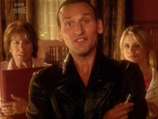 |
| Aliens
of London/World War Three |
|
 Situations like his encounter with the Incorporation reflected the Ninth’s fundamental weakness as a Doctor; while he expressed disdain for humans’ intellectual abilities, this Doctor occasionally appeared less intelligent than other incarnations. More than once he had to be saved by others coming up with their own plans where other Doctors could have come up with escape strategies on their own or never fallen into those traps in the first place, such as The Gelth tricking The Doctor into helping them spread over London by playing on his guilt over the Time War ("The Unquiet Dead"). The Doctor sometimes fell victim to minor deceptions such as his jacket being stolen while he was attending a dinner ("The Clockwise Man"), and needed help identifying the Slitheen's planet of origin by having his companions go over the facts available about them so that he could narrow down the options ("Aliens of London/World War Three"). He also regularly displayed a certain lack of the ‘on-the-spot’ initiative that had often characterised some of his previous selves, such as when he locked himself and his companions in the conference room of 10 Downing Street to escape The Slitheen without considering how he would defeat the invasion trapped inside the conference room ("Aliens of London/World War Three") or gave himself the ‘alias’ of ‘Doctor Table’ to rescue a Neanderthal from a hospital rather than come up with something more original ("Only Human"). Situations like his encounter with the Incorporation reflected the Ninth’s fundamental weakness as a Doctor; while he expressed disdain for humans’ intellectual abilities, this Doctor occasionally appeared less intelligent than other incarnations. More than once he had to be saved by others coming up with their own plans where other Doctors could have come up with escape strategies on their own or never fallen into those traps in the first place, such as The Gelth tricking The Doctor into helping them spread over London by playing on his guilt over the Time War ("The Unquiet Dead"). The Doctor sometimes fell victim to minor deceptions such as his jacket being stolen while he was attending a dinner ("The Clockwise Man"), and needed help identifying the Slitheen's planet of origin by having his companions go over the facts available about them so that he could narrow down the options ("Aliens of London/World War Three"). He also regularly displayed a certain lack of the ‘on-the-spot’ initiative that had often characterised some of his previous selves, such as when he locked himself and his companions in the conference room of 10 Downing Street to escape The Slitheen without considering how he would defeat the invasion trapped inside the conference room ("Aliens of London/World War Three") or gave himself the ‘alias’ of ‘Doctor Table’ to rescue a Neanderthal from a hospital rather than come up with something more original ("Only Human").
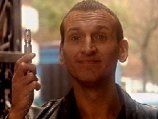 |
| Boom
Town |
|
Despite this, he still had a significant amount of raw intelligence, quickly determining how to reverse teleportation systems to prevent his enemies escaping ("The End of the World" and "Boom Town"), giving Rose instructions that allowed her to pose as an astrophysicist using code phrases that only they would understand ("The Monsters Inside"), refining a gene that would allow humans in the vicinity to temporarily breathe fire using a rogue geneticist’s equipment ("Only Human") and putting together a Delta Wave emitter in under an hour despite his initial claim that it would take three weeks (Although this may have been referring to the time he would need to refine it to only target his enemies rather than a setting that would kill everything).
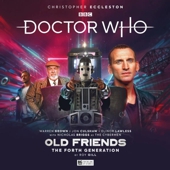 |
Old Friends "The Forth Generation"
(Roy Gill) |
|
 While his intellect might have been more limited than other incarnations, this Doctor was far more willing to express his humanity than others, even if he was fundamentally still very alien. As though trying to make up for his previous incarnation’s ruthlessness in the Time War, The Doctor found himself in situations that involved showing compassion for other old enemies, such as helping to save a colony of Sontarans who had evolved a life away from war ("Salvation Nine") or trying to help a damaged Cyberman be something other than its usual self, even if he ultimately had to mercy-kill that Cyberman because it accepted that it could never be human again ("Monster in Metropolis"). Despite his superficially light-hearted appearance, the Ninth Doctor had a melancholy and lonely personality, which he mainly concealed with the habit his past selves had of making jokes in the face of danger, only letting his 'guard' down when he was alone. His loneliness could be attributed to his guilt at being the last survivor of the Time War, all other Time Lords having lost their lives in the conflict, leaving him to deal with the guilt and knowledge that he had survived the destruction of his entire race. This was best emphasised by his refusal to take on new companions for some time, feeling as though he wasn’t ready to travel with people full-time after the War Doctor spent so long waging a solo campaign. He enjoyed the chance to reunite with old friends, such as The Brigadier ("Way of the Burryman/The Forth Generation") and Liv Chenka ("Flatpack"), affirming that his friends had always been important to him even when they were so short-lived compared to him. However, while he acknowledged Liv’s advice to find a friend after seeing a dark possible future caused by him being alone, The Doctor made it clear that he preferred travelling solo at this point in his lives. On another occasion, he even tried to avoid a reunion with Bernice Summerfield when he had to infiltrate one of her digs to recover the TARDIS after it was lost in the past ("Buried Threats: Ancient History"), even adopting the alias ‘Professor Arthur Fandango’ rather than explain to Benny everything he had recently gone through, talking around the matter of the Time War rather than admit the truth. Although he travelled with Callen Lennox for a time after Callen’s mother and the rest of his colony were killed by the Red Darkness ("Red Darkness") - a hybrid of the Vermine ("The Colour of Terror") and the Vashta Nerada ("Silence in the Library/Forest of the Dead") - The Doctor made it clear that he was just trying to find Callen somewhere else to live rather than taking him in the TARDIS full-time, feeling that he wasn’t ready to see how a new companion would change as a result of prolonged time with him. While his intellect might have been more limited than other incarnations, this Doctor was far more willing to express his humanity than others, even if he was fundamentally still very alien. As though trying to make up for his previous incarnation’s ruthlessness in the Time War, The Doctor found himself in situations that involved showing compassion for other old enemies, such as helping to save a colony of Sontarans who had evolved a life away from war ("Salvation Nine") or trying to help a damaged Cyberman be something other than its usual self, even if he ultimately had to mercy-kill that Cyberman because it accepted that it could never be human again ("Monster in Metropolis"). Despite his superficially light-hearted appearance, the Ninth Doctor had a melancholy and lonely personality, which he mainly concealed with the habit his past selves had of making jokes in the face of danger, only letting his 'guard' down when he was alone. His loneliness could be attributed to his guilt at being the last survivor of the Time War, all other Time Lords having lost their lives in the conflict, leaving him to deal with the guilt and knowledge that he had survived the destruction of his entire race. This was best emphasised by his refusal to take on new companions for some time, feeling as though he wasn’t ready to travel with people full-time after the War Doctor spent so long waging a solo campaign. He enjoyed the chance to reunite with old friends, such as The Brigadier ("Way of the Burryman/The Forth Generation") and Liv Chenka ("Flatpack"), affirming that his friends had always been important to him even when they were so short-lived compared to him. However, while he acknowledged Liv’s advice to find a friend after seeing a dark possible future caused by him being alone, The Doctor made it clear that he preferred travelling solo at this point in his lives. On another occasion, he even tried to avoid a reunion with Bernice Summerfield when he had to infiltrate one of her digs to recover the TARDIS after it was lost in the past ("Buried Threats: Ancient History"), even adopting the alias ‘Professor Arthur Fandango’ rather than explain to Benny everything he had recently gone through, talking around the matter of the Time War rather than admit the truth. Although he travelled with Callen Lennox for a time after Callen’s mother and the rest of his colony were killed by the Red Darkness ("Red Darkness") - a hybrid of the Vermine ("The Colour of Terror") and the Vashta Nerada ("Silence in the Library/Forest of the Dead") - The Doctor made it clear that he was just trying to find Callen somewhere else to live rather than taking him in the TARDIS full-time, feeling that he wasn’t ready to see how a new companion would change as a result of prolonged time with him.
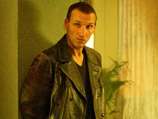 |
| The Unquiet Dead |
|
 Regardless of whether he was travelling alone or with company, the Ninth Doctor would ultimately demonstrate a personality that combined some of the best qualities of his previous selves; the frivolity and emotional availability of the Eighth Doctor, the ingenuity of the Third Doctor, the apparent vulnerability of the Fifth Doctor, the keen sense of humour of the Second Doctor (As well as the early Seventh Doctor), the depth of feeling of the Sixth Doctor, the (occasional) irascibility of the First Doctor, and the quirkiness and refusal to be mistaken for a human of the Fourth Doctor. On some occasions he also demonstrated a certain enthusiasm for his travels, showing great excitement when he met Charles Dickens ("The Unquiet Dead"), becoming enthusiastic when he realised he had met the historical inspiration for Lady MacBeth ("The Curse of Lady MacBeth"), or travelling to a particular hotel to witness the founding of the British football league ("The Beautiful Game"). Regardless of whether he was travelling alone or with company, the Ninth Doctor would ultimately demonstrate a personality that combined some of the best qualities of his previous selves; the frivolity and emotional availability of the Eighth Doctor, the ingenuity of the Third Doctor, the apparent vulnerability of the Fifth Doctor, the keen sense of humour of the Second Doctor (As well as the early Seventh Doctor), the depth of feeling of the Sixth Doctor, the (occasional) irascibility of the First Doctor, and the quirkiness and refusal to be mistaken for a human of the Fourth Doctor. On some occasions he also demonstrated a certain enthusiasm for his travels, showing great excitement when he met Charles Dickens ("The Unquiet Dead"), becoming enthusiastic when he realised he had met the historical inspiration for Lady MacBeth ("The Curse of Lady MacBeth"), or travelling to a particular hotel to witness the founding of the British football league ("The Beautiful Game").
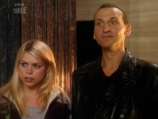 |
| The End of the World |
|
He would also sometimes philosophically muse about various minor matters, such as when he commented that humanity spent so much time wondering about how they would die that they never considered the possibility that they might survive ("The End of the World") or when he reflected that a flower Rose had found on her first trip to an alien world could be the local equivalent of a daisy or the rarest flower in the universe ("The Monsters Inside"). He also displayed his past selves' dislike of violence, although like many of them, he wasn't afraid to use it if he had to, taking up a gun in "Dalek", breaking a window with a robot’s head to escape an underwater tunnel - although this can be excused due to the sonic screwdriver having been stolen - ("The Clockwise Man"), and knocking out a guard in "Bad Wolf/The Parting of the Ways". However, his temper was far more apparent than in past lives; unlike the Fourth Doctor, who once said 'It may be irrational of me, but human beings are quite my favourite species', the Ninth Doctor often referred to humans as 'stupid apes', and showed less patience with them than he used to, sometimes seeming unimpressed by their mental and observational qualities, yet at the same time wanting to protect them and other species.
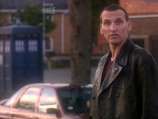 |
| The Doctor in "Rose" |
|
 Eventually, The Doctor accepted that he was ready to resume travelling with a companion on a regular basis when his latest confrontation with the Nestene Consciousness led him to Earth in London, 2005, meeting shop assistant Rose Tyler as he checked out a department store where Nestene energy had been detected ("Rose"). With Rose's help, The Doctor was able to track the main Nestene Consciousness to its base under the London Eye, where Rose was able to take it out with a sample of antiplastic The Doctor had prepared earlier while The Doctor fought with an Auton. Having defeated the Consciousness, The Doctor offered Rose the chance to travel with him, but Rose initially rejected the offer, prompting The Doctor to depart on his own, accepting her rejection as a sign that he still wasn’t ready for a companion. However, after a brief trip with new potential companion Ali - which nearly went wrong due to Ali’s nature as a Karkinian causing her to approach threats in a more violent manner than The Doctor might prefer ("The Beast of Babylon") - The Doctor returned to Rose based on Ali’s suggestion, informing her that the TARDIS travelled in time as well as space. Her interest inspired once more, Rose thus joined the Ninth Doctor for the trip of a lifetime with a Doctor who was ready to be The Doctor again. Eventually, The Doctor accepted that he was ready to resume travelling with a companion on a regular basis when his latest confrontation with the Nestene Consciousness led him to Earth in London, 2005, meeting shop assistant Rose Tyler as he checked out a department store where Nestene energy had been detected ("Rose"). With Rose's help, The Doctor was able to track the main Nestene Consciousness to its base under the London Eye, where Rose was able to take it out with a sample of antiplastic The Doctor had prepared earlier while The Doctor fought with an Auton. Having defeated the Consciousness, The Doctor offered Rose the chance to travel with him, but Rose initially rejected the offer, prompting The Doctor to depart on his own, accepting her rejection as a sign that he still wasn’t ready for a companion. However, after a brief trip with new potential companion Ali - which nearly went wrong due to Ali’s nature as a Karkinian causing her to approach threats in a more violent manner than The Doctor might prefer ("The Beast of Babylon") - The Doctor returned to Rose based on Ali’s suggestion, informing her that the TARDIS travelled in time as well as space. Her interest inspired once more, Rose thus joined the Ninth Doctor for the trip of a lifetime with a Doctor who was ready to be The Doctor again.
 The Doctor’s association with Rose led to him gaining regular contacts on Earth for the first time since he had ceased working with UNIT, rather than just meeting up with someone already involved in the crisis and enlisting their aid in sorting it out. In this case, the Ninth Doctor’s associates were Rose's mother, Jackie Tyler, and Rose's ex-boyfriend Mickey. Despite his apparent dislike of the two of them, reflected on such occasions as The Doctor being unwilling to even thank Mickey after his assistance proved vital in saving innocent lives while battling the Quervils in "Winner Takes All", it was evident that he appreciated them in his own way. Although his initial meetings with Jackie were relatively tense, he respected her concerns about Rose travelling with him, and entrusted Mickey with a virus that would wipe all information relating to The Doctor from the internet, although Mickey never apparently used it. By the time he began travelling with Rose, The Doctor had also begun using certain minor gadgets on a more regular basis, ranging from his rebuilt sonic screwdriver to psychic paper, with which he could show anyone looking at it whatever he wanted them to see, thus providing himself with ready-made 'official documentation' whenever he needed it. On their second adventure, The Doctor modified Rose's mobile phone so that she could call home from wherever - or even whenever - she was (As well as the more basic advantage of allowing her to call home even if normal phones couldn't receive a signal in her current location, such as when they were trapped in the Downing Street cabinet room). The Doctor’s association with Rose led to him gaining regular contacts on Earth for the first time since he had ceased working with UNIT, rather than just meeting up with someone already involved in the crisis and enlisting their aid in sorting it out. In this case, the Ninth Doctor’s associates were Rose's mother, Jackie Tyler, and Rose's ex-boyfriend Mickey. Despite his apparent dislike of the two of them, reflected on such occasions as The Doctor being unwilling to even thank Mickey after his assistance proved vital in saving innocent lives while battling the Quervils in "Winner Takes All", it was evident that he appreciated them in his own way. Although his initial meetings with Jackie were relatively tense, he respected her concerns about Rose travelling with him, and entrusted Mickey with a virus that would wipe all information relating to The Doctor from the internet, although Mickey never apparently used it. By the time he began travelling with Rose, The Doctor had also begun using certain minor gadgets on a more regular basis, ranging from his rebuilt sonic screwdriver to psychic paper, with which he could show anyone looking at it whatever he wanted them to see, thus providing himself with ready-made 'official documentation' whenever he needed it. On their second adventure, The Doctor modified Rose's mobile phone so that she could call home from wherever - or even whenever - she was (As well as the more basic advantage of allowing her to call home even if normal phones couldn't receive a signal in her current location, such as when they were trapped in the Downing Street cabinet room).
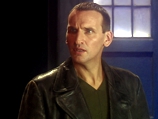 |
| The Doctor in "Dalek" |
|
 Despite his attempts to overcome his War-related trauma, the Ninth Doctor had to face the horrors of the Time War once again when the TARDIS materialised in the alien collection of billionaire Henry Van Statten and The Doctor was asked to look at Van Statten's only live specimen, which The Doctor was horrified to learn was apparently the last Dalek in the universe. In the confrontation with it, The Doctor showed a side of himself that had never been seen before; the side that not only truly hated the Dalek, but actually took delight in its pain and frustration, as well as its helplessness due to a damaged gun, The Doctor confidently proclaiming his role in the destruction of the Dalek fleet before becoming more melancholy when the Dalek’s questions forced him to recognise his own status as the last of his kind. The Doctor was initially angry at the Dalek claiming that the two were the same because of this, but then claimed that it had a point, as he knew what it deserved. The Doctor then showed his vicious side in the confrontation with the Dalek, sending massive electric shocks through it and dismissing its plea to have pity where past Doctors would take the Daleks’ lack of mercy as a reason to show it. As the Dalek broke out of its cell and began to advance out of the underground base, The Doctor ordered it to die after establishing a video communication with it, to which the Dalek replied that 'You [The Doctor] would make a good Dalek'. When Rose was cornered by the Dalek, The Doctor took up an alien gun to stop it, but, in the confrontation between him and the Dalek, it took Rose to point out that the Dalek had changed... and The Doctor realised that, if he continued what he was doing, he too would have changed into what he'd always fought. Despite his attempts to overcome his War-related trauma, the Ninth Doctor had to face the horrors of the Time War once again when the TARDIS materialised in the alien collection of billionaire Henry Van Statten and The Doctor was asked to look at Van Statten's only live specimen, which The Doctor was horrified to learn was apparently the last Dalek in the universe. In the confrontation with it, The Doctor showed a side of himself that had never been seen before; the side that not only truly hated the Dalek, but actually took delight in its pain and frustration, as well as its helplessness due to a damaged gun, The Doctor confidently proclaiming his role in the destruction of the Dalek fleet before becoming more melancholy when the Dalek’s questions forced him to recognise his own status as the last of his kind. The Doctor was initially angry at the Dalek claiming that the two were the same because of this, but then claimed that it had a point, as he knew what it deserved. The Doctor then showed his vicious side in the confrontation with the Dalek, sending massive electric shocks through it and dismissing its plea to have pity where past Doctors would take the Daleks’ lack of mercy as a reason to show it. As the Dalek broke out of its cell and began to advance out of the underground base, The Doctor ordered it to die after establishing a video communication with it, to which the Dalek replied that 'You [The Doctor] would make a good Dalek'. When Rose was cornered by the Dalek, The Doctor took up an alien gun to stop it, but, in the confrontation between him and the Dalek, it took Rose to point out that the Dalek had changed... and The Doctor realised that, if he continued what he was doing, he too would have changed into what he'd always fought.
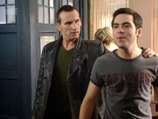 |
| The Long Game |
|
 This Doctor’s greater hostility was further explored during confrontations with his own companions. During a trip to Satellite Five in the year 200,000, new companion Adam Mitchell attempted to transfer information from the future back into his own time after having a chip planted in his head, nearly resulting in a being called the Jagrafess gaining access to the TARDIS, until another resident of the space station where they'd landed managed to shut the Jagrafess down ("The Long Game"). Despite the fact that no harm had been done, outraged at Adam’s violation of his trust, The Doctor took him home and kicked him off the TARDIS in a fit of rage, condemning him to a lifetime of non-importance as merely going inside meant he ran the risk of the implant being discovered and his head cut open by curious scientists.
When a subsequent trip into Rose’s past led to her saving her father from his death ("Father's
Day"),
The Doctor almost left Rose behind out of anger at her selfish actions, apparently only staying because the TARDIS had lost its link to its interior dimensions due to the destabilisation of reality. Forced to battle the time-beasts known as the Reapers while they fed on the 'scar tissue' of the tear in time caused by Rose's actions, this particular experience also gave The Doctor a chance to show his kinder side. When trapped in a church and talking to a young couple about to get married, he told them that even though he’d travelled to places and done things they couldn’t imagine, he’d never had an ordinary life like them... and, on some level, it was obvious that he wished he could have had that chance, if the universe was only a kinder, safer place. This Doctor’s greater hostility was further explored during confrontations with his own companions. During a trip to Satellite Five in the year 200,000, new companion Adam Mitchell attempted to transfer information from the future back into his own time after having a chip planted in his head, nearly resulting in a being called the Jagrafess gaining access to the TARDIS, until another resident of the space station where they'd landed managed to shut the Jagrafess down ("The Long Game"). Despite the fact that no harm had been done, outraged at Adam’s violation of his trust, The Doctor took him home and kicked him off the TARDIS in a fit of rage, condemning him to a lifetime of non-importance as merely going inside meant he ran the risk of the implant being discovered and his head cut open by curious scientists.
When a subsequent trip into Rose’s past led to her saving her father from his death ("Father's
Day"),
The Doctor almost left Rose behind out of anger at her selfish actions, apparently only staying because the TARDIS had lost its link to its interior dimensions due to the destabilisation of reality. Forced to battle the time-beasts known as the Reapers while they fed on the 'scar tissue' of the tear in time caused by Rose's actions, this particular experience also gave The Doctor a chance to show his kinder side. When trapped in a church and talking to a young couple about to get married, he told them that even though he’d travelled to places and done things they couldn’t imagine, he’d never had an ordinary life like them... and, on some level, it was obvious that he wished he could have had that chance, if the universe was only a kinder, safer place.
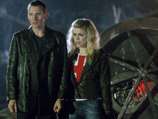 |
| The Empty Child/The Doctor Dances |
|
 His continued compassion for humanity was reflected during a later adventure in London in World War Two ("The Empty Child/The Doctor Dances"), where The Doctor not only gained a new companion in the form of ex-Time Agent Captain Jack Harkness but simultaneously saved the entire city from an infection by renegade nanogenes that Jack had unintentionally released on the city. Reprogramming the genes by discovering ‘Patient Zero’ - a young boy who had been unintentionally ‘infected’ with the genes and improperly repaired due to their lack of knowledge of human anatomy - The Doctor not only demonstrated his joy at the knowledge that he had managed to save everyone who had been altered by the nanogenes, but also displayed his continued fondness for humanity, praising the dedication of Doctor Constantine, who had continued to care for his nanogene-infected patients even when he had lost his entire family and had no idea what was wrong with the victims, and expressing great glee at being able to reunite a mother with her child by curing him of the ‘infection’, his optimism and general enthusiasm given a significant boost. The Doctor and Rose then departed, after picking up Jack as their new companion from his soon-to-self-destruct spaceship. His continued compassion for humanity was reflected during a later adventure in London in World War Two ("The Empty Child/The Doctor Dances"), where The Doctor not only gained a new companion in the form of ex-Time Agent Captain Jack Harkness but simultaneously saved the entire city from an infection by renegade nanogenes that Jack had unintentionally released on the city. Reprogramming the genes by discovering ‘Patient Zero’ - a young boy who had been unintentionally ‘infected’ with the genes and improperly repaired due to their lack of knowledge of human anatomy - The Doctor not only demonstrated his joy at the knowledge that he had managed to save everyone who had been altered by the nanogenes, but also displayed his continued fondness for humanity, praising the dedication of Doctor Constantine, who had continued to care for his nanogene-infected patients even when he had lost his entire family and had no idea what was wrong with the victims, and expressing great glee at being able to reunite a mother with her child by curing him of the ‘infection’, his optimism and general enthusiasm given a significant boost. The Doctor and Rose then departed, after picking up Jack as their new companion from his soon-to-self-destruct spaceship.
 Shortly after this, The Doctor was transported back to Satellite Five ("Bad Wolf/The Parting of the Ways"), where he, Rose and Jack found themselves facing a new Dalek army that had been assembled by the Dalek Emperor, another survivor of the Time War, abducting humans by using seemingly fatal game shows - the shows apparently culminated in peoples’ deaths when in reality they were transmatted over to the Dalek ships and used to provide genetic samples to create new Daleks -, the controller of Satellite Five having defied her masters long enough to bring in The Doctor to stop them as the only man they had ever feared. While Rose and the TARDIS were sent to her home time, Jack organised the humans remaining on Satellite Five into a defence against the Daleks while The Doctor began construction of a delta wave emitter, a device that would fry the brain of every Dalek in the blast radius... and, unfortunately, every human on Earth as well, since The Doctor wouldn't have time to refine the blast in the hour or so before the Daleks arrived. As all the humans on Satellite Five fell in a desperate attempt to buy time for The Doctor, he completed construction of the delta wave emitter just as Dalek forces arrived in the control room with him... but, even though Earth had already been decimated by Dalek bombs, when faced with the chance to destroy the Daleks at the cost of whatever life was left on Earth, The Doctor refused, preferring to be a coward rather than commit genocide to vanquish the Daleks for a second time. Gleefully, the Emperor ordered The Doctor exterminated, but, at the last minute, Rose arrived, imbued with all the power of the Time Vortex, and using it to turn the entire Dalek fleet into dust. However, the vortex energy was so powerful that it would have killed her, so The Doctor was forced to take the energy into himself... along with all the damage Rose had already sustained. As Rose recovered in the TARDIS, having apparently forgotten everything about her brief reign as a god, The Doctor revealed that the energy of the Time Vortex was destroying every cell in his body, and he would soon regenerate, meaning that he wouldn't see her again 'with this daft old face'. Rose begged him not to talk like that, but The Doctor kept on talking, telling her 'Before I go, I just want to tell you, you were fantastic. Absolutely fantastic. And you know something? So was I'. Shortly after this, The Doctor was transported back to Satellite Five ("Bad Wolf/The Parting of the Ways"), where he, Rose and Jack found themselves facing a new Dalek army that had been assembled by the Dalek Emperor, another survivor of the Time War, abducting humans by using seemingly fatal game shows - the shows apparently culminated in peoples’ deaths when in reality they were transmatted over to the Dalek ships and used to provide genetic samples to create new Daleks -, the controller of Satellite Five having defied her masters long enough to bring in The Doctor to stop them as the only man they had ever feared. While Rose and the TARDIS were sent to her home time, Jack organised the humans remaining on Satellite Five into a defence against the Daleks while The Doctor began construction of a delta wave emitter, a device that would fry the brain of every Dalek in the blast radius... and, unfortunately, every human on Earth as well, since The Doctor wouldn't have time to refine the blast in the hour or so before the Daleks arrived. As all the humans on Satellite Five fell in a desperate attempt to buy time for The Doctor, he completed construction of the delta wave emitter just as Dalek forces arrived in the control room with him... but, even though Earth had already been decimated by Dalek bombs, when faced with the chance to destroy the Daleks at the cost of whatever life was left on Earth, The Doctor refused, preferring to be a coward rather than commit genocide to vanquish the Daleks for a second time. Gleefully, the Emperor ordered The Doctor exterminated, but, at the last minute, Rose arrived, imbued with all the power of the Time Vortex, and using it to turn the entire Dalek fleet into dust. However, the vortex energy was so powerful that it would have killed her, so The Doctor was forced to take the energy into himself... along with all the damage Rose had already sustained. As Rose recovered in the TARDIS, having apparently forgotten everything about her brief reign as a god, The Doctor revealed that the energy of the Time Vortex was destroying every cell in his body, and he would soon regenerate, meaning that he wouldn't see her again 'with this daft old face'. Rose begged him not to talk like that, but The Doctor kept on talking, telling her 'Before I go, I just want to tell you, you were fantastic. Absolutely fantastic. And you know something? So was I'.
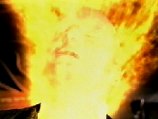 |
| Bad Wolf/The Parting of the Ways |
|
 And, as the radiation of the Time Vortex burst from his sleeves and neck, transforming him into his tenth incarnation as the cells in his body died once and all, nobody watching could deny the truth of his last words to the universe. Even though he had a short life compared to his other selves, the Ninth Doctor had made an incredible impact on a new generation of viewers, bringing a modern-day legend back to our screens, reminding children that sofas weren't just for sitting on, and teaching a whole new generation that the police box was a widely-recognized symbol of heroism in a world that needed heroes like never before. When a crisis saw the Tenth Doctor, the Eleventh Doctor and the Twelfth Doctor being attacked by a corrupted version of the Twelfth Doctor who presented them with dark alternate timelines for themselves post-Time War ("Four Doctors"), the three speculated that the corrupted Twelfth hadn’t included the Ninth Doctor in his attack because he couldn’t find any world where the Ninth Doctor was anything less than ‘Fantastic’, reflecting the high opinion his successors had of this incarnation despite his brevity. And, as the radiation of the Time Vortex burst from his sleeves and neck, transforming him into his tenth incarnation as the cells in his body died once and all, nobody watching could deny the truth of his last words to the universe. Even though he had a short life compared to his other selves, the Ninth Doctor had made an incredible impact on a new generation of viewers, bringing a modern-day legend back to our screens, reminding children that sofas weren't just for sitting on, and teaching a whole new generation that the police box was a widely-recognized symbol of heroism in a world that needed heroes like never before. When a crisis saw the Tenth Doctor, the Eleventh Doctor and the Twelfth Doctor being attacked by a corrupted version of the Twelfth Doctor who presented them with dark alternate timelines for themselves post-Time War ("Four Doctors"), the three speculated that the corrupted Twelfth hadn’t included the Ninth Doctor in his attack because he couldn’t find any world where the Ninth Doctor was anything less than ‘Fantastic’, reflecting the high opinion his successors had of this incarnation despite his brevity.
|
|

